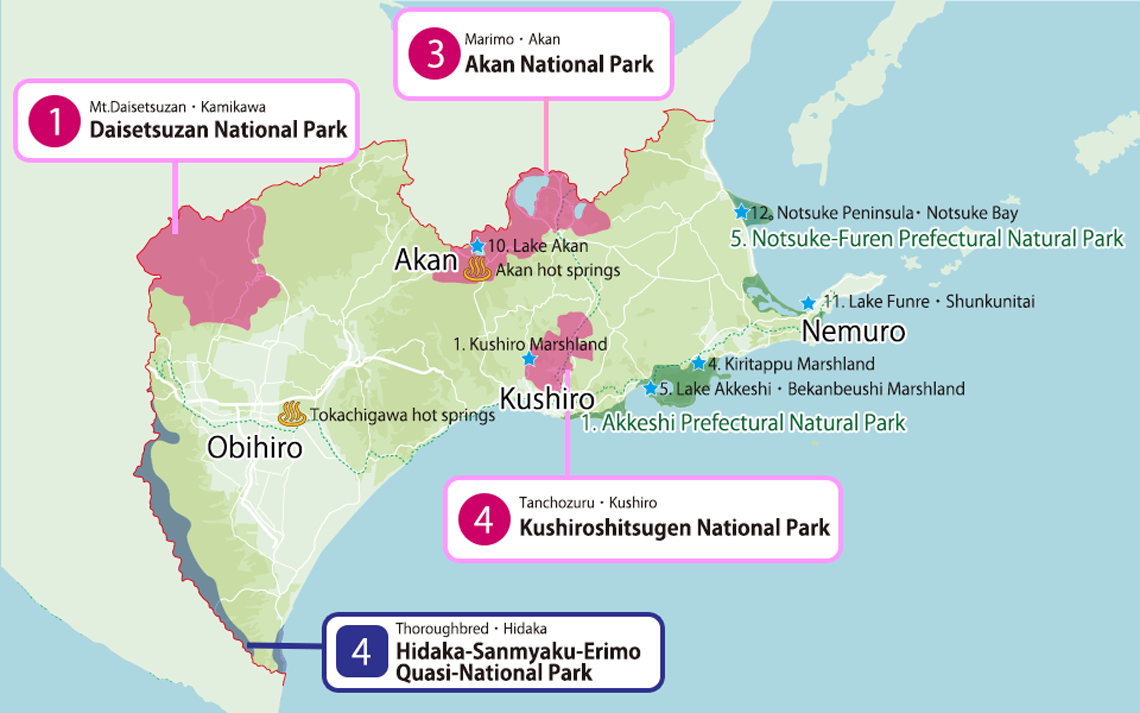- UU-Hkkaido
- Hokkaido for 10,000 yen!
- Obihiro, Kushiro,Nakashibetsu Airport Outskirts



The Tokachi Plains spreading out in the south side of Daisetsuzan National Park is a prosperous kingdom of cuisine that with production centers for eminent Japanese soybeans, adzuki beans, wheat, potatoes, and the breeding of the domestic animals such as cows, pigs, and chickens. From Kushiro to Nemuro there is the sightseeing area with two national parks, Lake Akan and the Kushiro Marsh, forming a very large Dairy Belt. Popular wild birds such as Japanese cranes and white-tailed sea eagles can be seen.

National ParkA nationally managed park, representing Japan's natural scenery. |
Daisetsuzan National ParkTaushubetsu River Bridge, Lake Nukabira, Lake Shikaribetsu, Mt. NipesotsuAkan-Mashu National ParkLake Akan, Lake Kussharo, Lake Mashu, Onneto, Ainu Kotan, Kawayu OnsenKushiroshitsugen National ParkKushiro Marsh Observatory, Onnenai Wooden Path, Hosooka Observatory, Lake Touro |
|---|
Quasi-National ParkThe park is managed by the prefecture with natural scenery based on a national park. |
Hidaka-Sanmyaku-Erimo Quasi-National ParkNissho Pass Observatory, Satsunaigawa EnchiAkkeshi-Kiritappu-Konbumori Quasi-National ParkCape Shirepa, Lake Akkeshi, Bekkanbeushi Marshland, Kiritappu Marshland, Ayamegahara |
|---|
Prefectural Natural ParkFollowing after national park, and quasi-national park is a park representing Hokkaido with its natural scenery. |
Notsuke-Furen Prefectural Natural ParkLake Furen, Onneto, Shunkunitai, Notsuke Peninsula, Todowara / Narawara, Odaitou, Hakuchodai |
|---|
Wetlands Registered Under the Ramsar ConventionWetlands registered by the convention on wetlands of international importance, especially as waterfowl habitat (Ramsar Convention). |
Kushiro MarshlandA stopover point for ducks and swans. The main breeding place of the red-crowned crane. It is also a habitat for large birds such as Blakiston's fish owls, white-tailed eagles, and Steller's sea eagles.Kiritappu MarshlandMany birds visit, including whooper swans, bean geese, anserinae waterfowl, and swans.Lake Akkeshi, Bekkanbeushi MarshlandThe highest possible wintering spot of the whooper swan in Japan.Lake AkanThe area grows rare algae including moss phlox. It is the habitat of many rare aquatic animals and plants including Sakhalin taimen, the biggest fresh water fish in Japan.Lake Furen, ShunkunitaiVisiting place for birds such as grey-tailed tattlers, and whooper swans.Notsuke Peninsula, Notsuke BayVisiting place for birds such as brents, and common goldeneyes. |
|---|